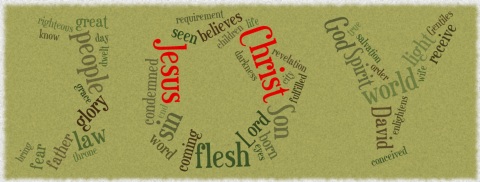Our God, Heaven cannot hold Him, nor earth sustain;
Heaven and earth shall flee away when He comes to reign.
In the bleak midwinter a stable place sufficed
The Lord God Almighty, Jesus Christ.
-Christina Rossetti (1872) t’s that time of year again
t’s that time of year again – time to
argue about the date of Christmas!
Was Jesus really born on the 25th of December? If not, when?
I have no plans to write a detailed comprehensive post on this one, for reasons which will become clear. But let’s just take a moment to rethink some of the things we hear over and over every year.
For example, we hear over and over that early Christians took over a pagan festival and turned it into a celebration of Christ’s birth. Is that true?
Unlikely.
Why? First of all, what was the earliest date (that we know of) that Christians thought of as the date of Christ’s birth? Actually, it was indeed mid-winter – early January (although even very early on there were various dates proposed to be correct). Here in Mexico we celebrate Three Kings Day on January 6th (Epiphany). But the 6th was the date when the Eastern Church celebrated Christmas. It appears this date is very early indeed.
The Western Church adapted the date to the 25th of December (no doubt assuming they were "right"), perhaps due to differences between the various calendars that were being used.
Hence we have the "12 Days of Christmas", from the 25th to the eve of the 6th.
How early is this date? The second century for sure, when it seemed to be well known – meaning it’s a very ancient date indeed.
So now we have a number of problems with the pagan festival theory. The date of the pagan sun festival was set by Emperor Aurelian in 274 AD – long after Christians already talked about the mid-winter date for Jesus’ birth. And the emperor set the date as the 25th of December, not the 6th of January.
So the 6th of January date makes it less likely to coincide with winter solstice and pagan festivals (again, there is a level of uncertainty due to the differences in calendars over the years).
Second, many believe that the pagans may have actually stolen the date from the persecuted Christians (to make a point, shall we say), since it appears likely that the Christian date came first. That’s right, there may be more evidence that it’s the other way around!
Third, doesn’t it seem a bit odd that early believers would use the date of a pagan festival for the birth of Jesus? Think about it:
- Early believers were a persecuted lot, and had little in common with the pagans around them. The writers of the New Testament were obviously soaked in the Jewish Scriptures, and hated the religions of the occupying force (the Romans). Early Christians (though there were certainly pagan offshoots of Christianity) often had to make a life and death choice to follow Christ, and wouldn’t have been the first to start adapting pagan festivals for their own use.
- One point that’s rarely mentioned is that the early Christians didn’t celebrate Christmas. There was no Christmas festival. That came later. In other words, it wasn’t a party – they were simply discussing a when Jesus was born from a historic point of view. Why steal the date of a pagan festival just to use as a historic date for Christ’s birth? This wasn’t at all a matter of wanting to party at the same time as everyone else.
It may indeed be that the Romans stole the date from the Christians – or simply that the dates were coincidentally close.
All right, but Jesus wasn’t really born late December/early January, was He?
Every year we hear more objections. The most well known is probably that sheep would not be feeding out in the wilderness in December, because of the climate in Israel at that time of year. That would be rainy season in Israel – a cold and wet time to be watching flocks.
But there are problems with this view. Luke doesn’t say the sheep were in the wilderness (but fields), and doesn’t say they were feeding. And early sources suggest that, although some sheep wouldn’t be out in the wilderness (or wherever) this time of year, that some would be out all year round. Sacrificial lambs in particular would be out when other flocks would not be (hmmm… that would be appropriate, wouldn’t it?). So yes, there probably were sheep in the fields this time of year.
Do we have other evidence that Jesus was born in mid-winter? Some have suggested that the priestly cycle in Israel also confirms a December date, because of when Zechariah was in the temple. (It would have been the Day of Atonement – John presumably conceived shortly thereafter, and then six months later Gabriel visits Mary (Luke 1:26), making John six months older than Jesus.)
As interesting as these calculations are, there are a lot of assumptions (do we have the calendar correlations right? Do we know for sure the priestly cycle at this time? Do we know exactly how when the children were conceived? etc etc etc). Others have tried the same calculations with different months resulting (July, September).
Perhaps the best evidence for the mid-winter date is simply that it’s a very ancient belief. The early Christians had information that has long been lost. Maybe they actually have the best guess of all.
And isn’t it possible that they knew more than we know about how flocks were taken care of then, and when the census was, and what priests were in the temple when? (Again, remembering that various dates were suggested early on – the point being that the end of December / early January is possible, not that it’s the only possibility)
I think we can conclude like this. We don’t know when Jesus was born. It’s quite possible it was right around this time of year. But if God had wanted us to know for sure, He could have told us.
Many early Christians believed that Jesus was born this time of year. And let’s be honest – the Bible makes a big deal of the birth of the Messiah. It’s obviously something worth celebrating.
But of course it looks forward to the more important date – the date of the crucifixion and resurrection, which early believers celebrated most certainly. In fact, they celebrated the resurrection when they met together each Sunday (the day of the week when Jesus rose). They celebrated His death in communion. They remembered his sacrifice during the time of the Passover.
So whenever Jesus was born, we can certainly remember it as the writers of the New Testament did – an incredible event when the Creator God invaded His creation in order to save His people. And that’s something we can truly celebrate all year ’round.
He will be great and will be called the Son of the Most High. And the Lord God will give to him the throne of his father David, and he will reign over the house of Jacob forever, and of his kingdom there will be no end. (Luke 1:32-33)
Fear not, for behold, I bring you good news of great joy that will be for all the people. For unto you is born this day in the city of David a Savior, who is Christ the Lord. (Luke 2:10-11)
Joseph, son of David, do not fear to take Mary as your wife, for that which is conceived in her is from the Holy Spirit. She will bear a son, and you shall call his name Jesus, for he will save his people from their sins. (Matthew 1:20-21)
Lord, now you are letting your servant depart in peace, according to your word; for my eyes have seen your salvation that you have prepared in the presence of all peoples, a light for revelation to the Gentiles, and for glory to your people Israel. (Luke 2:29-32)
There is therefore now no condemnation for those who are in Christ Jesus. For the law of the Spirit of life has set you free in Christ Jesus from the law of sin and death.
For God has done what the law, weakened by the flesh, could not do. By sending his own Son in the likeness of sinful flesh and for sin, he condemned sin in the flesh, in order that the righteous requirement of the law might be fulfilled in us, who walk not according to the flesh but according to the Spirit. (Romans 8:1-4)
I have come into the world as light, so that whoever believes in me may not remain in darkness. (John 12:46)
The true light, which enlightens everyone, was coming into the world. He was in the world, and the world was made through him, yet the world did not know him. He came to his own, and his own people did not receive him.
But to all who did receive him, who believed in his name, he gave the right to become children of God, who were born, not of blood nor of the will of the flesh nor of the will of man, but of God.
And the Word became flesh and dwelt among us, and we have seen his glory, glory as of the only Son from the Father, full of grace and truth. (John 1:9-14)

Word cloud based on the passages above


 t’s that time of year again – time to argue about the date of Christmas! Was Jesus really born on the 25th of December? If not, when?
t’s that time of year again – time to argue about the date of Christmas! Was Jesus really born on the 25th of December? If not, when?

